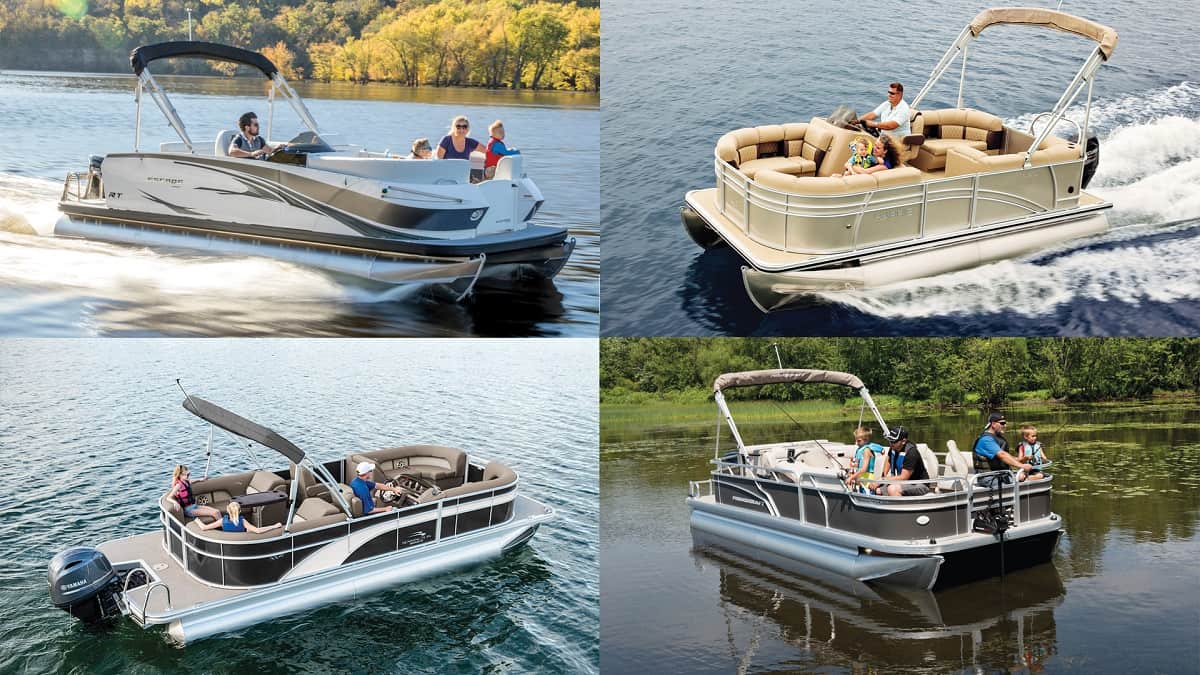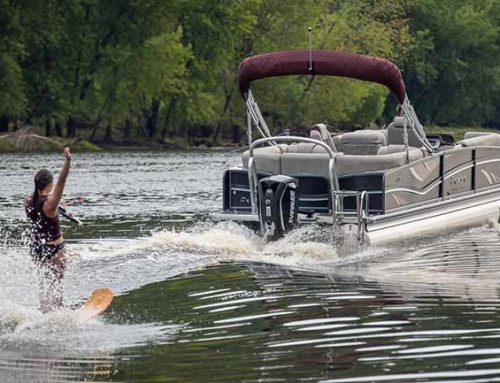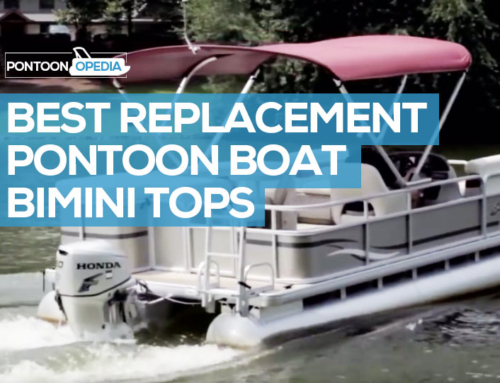Do you want to entertain your family and friends on the water? Have you narrowed your search to either a pontoon boat or a deck boat but can’t quite decide which one is right for you?
If you answered yes to the questions above, then you’ve come to the right place. In this article, we’ll compare deck boats vs. pontoons to give you a better feel for which one is the best option for you. As you’ll see, while the two are highly similar, there are some distinct differences to consider. Let’s take a closer look.
Before we start comparing and contrasting, we should provide a bit of historical context. Of the two types of boats, pontoons are older, making their first appearance at the 1958 World’s Fair and being available for purchase not long after, while the deck boat didn’t hit the market until 1974.
Initially, the two types of boats were starkly different, offering vastly different capabilities. However, these days, they share a great many traits and features in common while still being distinct enough that they are best used in different ways.
Hull Differences
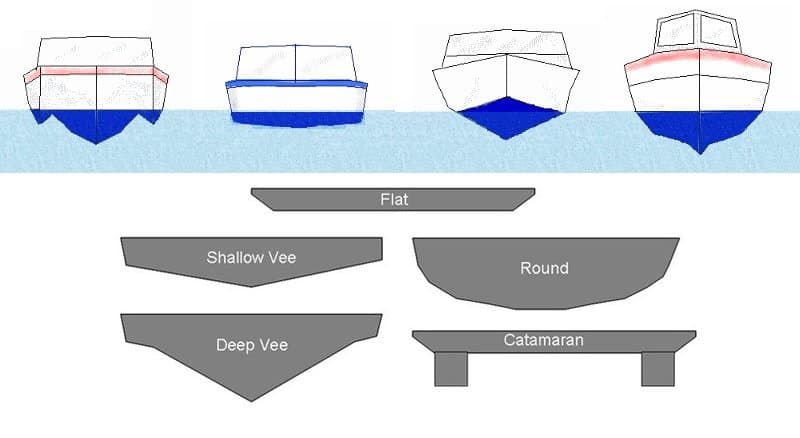
The most obvious difference is in the hull itself. A pontoon boat is typically quite boxy looking, resting on two aluminum tubes at either edge of the craft, while the deck boat has a traditional V hull, typically made of fiberglass.
Those hull differences are important in two different ways, both of which bear serious consideration.
Pontoon boats tend to be more fuel-efficient but are usually operated in more sheltered waters and at much slower speeds than deck boats. The speed issue is less true now than it was in years past, and it’s entirely possible to add a large outboard motor to a pontoon boat and boost its speed to rival that of the generally faster deck boats, certainly fast enough to pull amateur tubers and skiers behind them.
Having said that, pontoon boats aren’t nearly as agile as deck boats, so if tubing and skiing are the primary activities you want to engage in, you’re probably better off going with the sleeker and generally speedier deck boat.
The other difference worth talking about here lies in the hull materials.
Pontoon boats, resting on aluminum tubes (pontoons), tend to be much lower maintenance than deck boats. The fiberglass hulls need constant care and attention to keep them looking good from one year to the next and even from one outing to the next.
If you want something relatively low maintenance, the pontoon gets the nod, and let’s face it, for most people, boat maintenance isn’t something that enhances the over all user experience.
Central to the design theory of pontoon boats is the notion of maximizing deck space, which in turn, maximizes the seating area and the number of people you can entertain on your boat. With that in mind, if you envision outings with larger parties, you’ll want to pay particular attention to the pontoon boats available in your price range.
Aesthetics
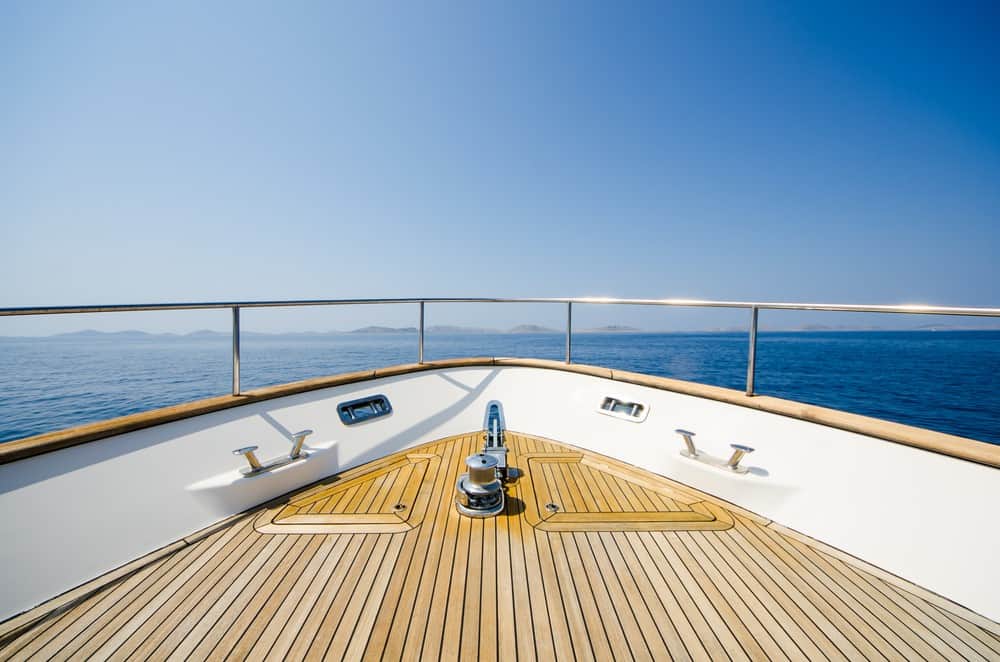
Another important question to consider is: how important are aesthetics to you? If looks matter, and you want something sleek and sexy, then you’re almost certainly going to gravitate toward a deck boat. As mentioned earlier, pontoon boats have a rather boxy appearance which some people don’t find attractive.
On the other hand, as mentioned, the whole idea behind the design of pontoon boats is to maximize deck space, which translates into maximizing entertaining space, so pound for pound, the pontoon boat will enable you to entertain a larger number of people than comparably sized deck boats will.
Here, it should be noted that if you’re willing to spend a little more on your pontoon boat, you’ll find that some of the models at the top end of the pricing spectrum are a bit sleeker looking. They still don’t hold a candle to most deck boats, but you can avoid at least some of that “floating box” appearance of the pontoon boat if your budget allows it.
At the end of the day, if you want to get appreciative glances from other boaters or people on the shore, deck boats tend to generate more of those types of reactions than pontoon boats do. Something to keep in mind if that’s important to you.
Price
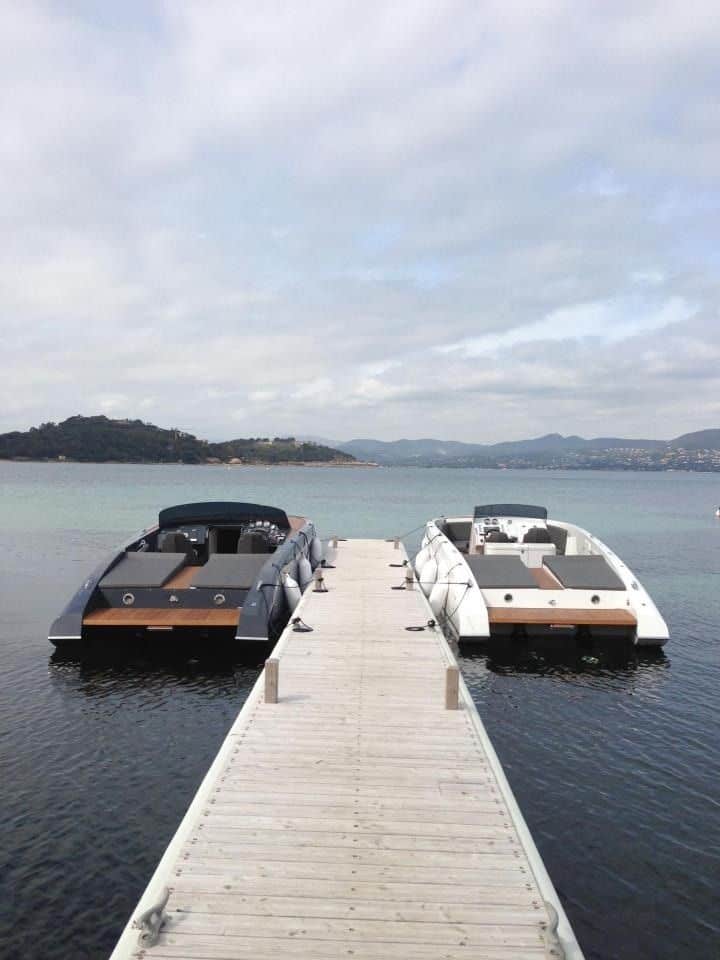
How much money do you have to spend? If you’re on a budget, then you should know that pontoon boats are generally less expensive than deck boats.
It should be noted, however, that the motor you choose to outfit your boat with can add up to 50% to the price of the boat itself. You could wind up spending as much on an outboard motor or I/O Motor as the boat itself, which can, in some cases, lead to a scenario where a pontoon boat winds up being more expensive than a deck boat, but on average, the opposite will prove true.
For example, you can get a good pontoon boat with a starting price of about $15,000, and extending up to around $60,000 or so for a deluxe pontoon with a big motor, while a deck boat will run you anywhere from $30,000 to $80,000.
As you can see then, at the high end, the lines begin to blur a bit and the differences aren’t so stark, but if your price point is closer to the low end, pontoon boats are about half the price of deck boats, a big difference for anyone on a budget.
Handling and Versatility
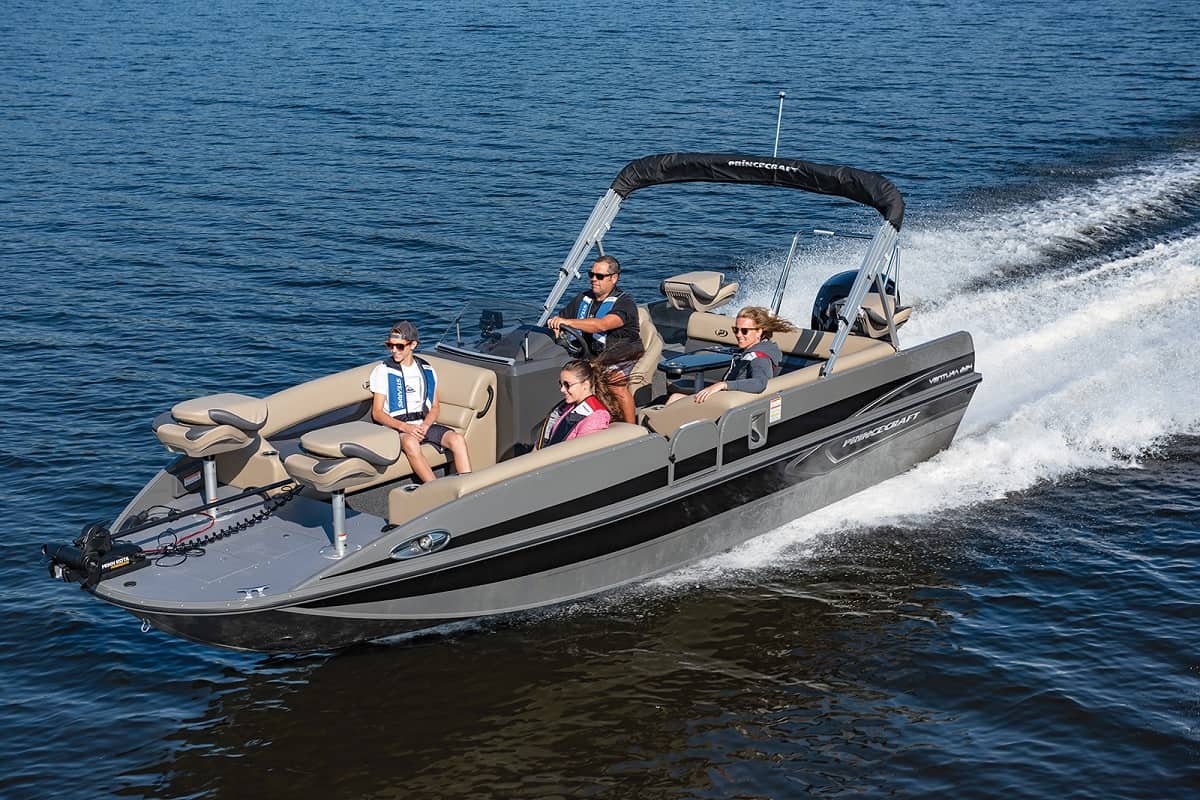
The deck boat and pontoon boat are pretty much tied in terms of versatility, though that versatility is expressed in very different ways. Given the hull design, the deck boat is much better when you’re planning on spending a lot of time moving.
If you’re interested in taking your family and friends on a pleasure cruise down an inland waterway, engage in a lot so skiing, or do some general sightseeing, the deck boat is the better fit for that. It’s nimbler, more agile, and on average, the faster craft. It just handles better when you’re going from Point A to Point B.
It’s also worth mentioning that if you have children, and you’re interested in making sure they stay seated and don’t move around too much, deck boats almost certainly get the nod. Odds are good that they’ll be in motion a greater percentage of the time, and even when not, they’re not as stable, which tends to encourage people to keep their seats.
On the other hand, the pontoon boat is basically a patio on the water, so it’s ideal for long, leisurely parties and cookouts, and it makes a great fishing platform as it’s inherently more stable than a deck boat. People can get up and move around more easily on a pontoon boat than they can on a deck boat.
This is not to say that deck boats can’t be used for fishing. It absolutely can! Both deck boats and pontoons can be outfitted with rod holders and other fishing related accessories, but in terms of stability on the water, pontoons have the edge.
Pros and Cons
While both types of watercraft are excellent, they excel at different things. Here’s a quick overview to guide you toward a decision:
Pontoon Boats
Pros:
- Pontoon boats offer extremely high stability.
- Lots of space – basically a patio or living room on the water. Higher seating capacity.
- Relatively inexpensive compared to deck boats
- Great for cookouts, fishing, or lounging on the water
Cons:
- Tend to be slower and don’t handle as well when moving across the water
- The boxy appearance of pontoons isn’t as attractive as a deck boat
- While it’s possible to two an amateur tuber or skier, most pontoons aren’t fast enough to provide much of a thrill to a more experienced skier
Deck Boats
Pros:
- Sleek, great-looking boat. Deck boats are very pleasing to the eye.
- It cuts through the water and handles well.
- Tend to be faster, thus, better suited to action-oriented watersports (deck boats make a better ski boats)
Cons:
- Relatively more expensive than a pontoon boat
- Less stable when stationary, so not as easy to move about
- Deck boats, on average, won’t hold as many people as pontoons.
Conclusion
So which type of boat is the best fit for you, a deck boat or a pontoon?
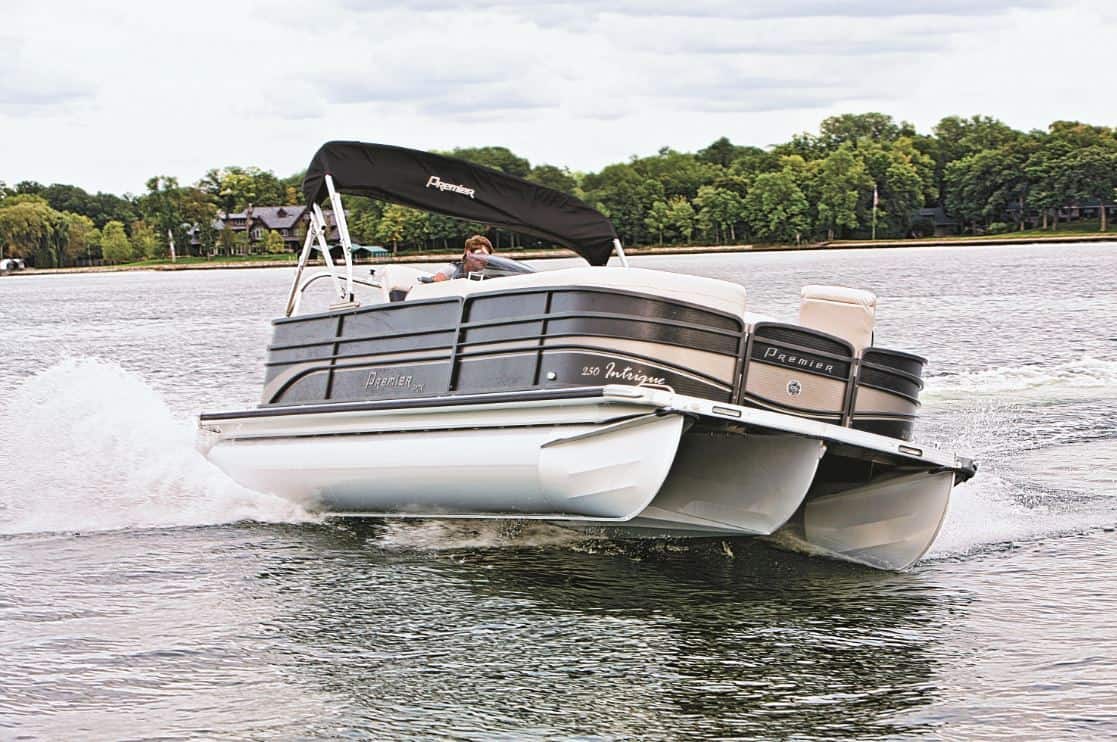
Ultimately, that’s a question only you can answer, and it comes down to how you plan to use the boat once you’ve got it in the water. Both are fantastic investments and unlock unlimited opportunities for fun and adventure for your family and friends, but in the final analysis, it comes down to what features matter most to you.
If you’re interested in getting the biggest bang for your boating buck, then you’ll almost certainly be more interested in the pontoon. That’s especially true if you’re also more interested in leisurely get-togethers in sheltered waterways where pontoons are most at home.
On the other hand, if you want something sleek and sexy, with a bit more get up and go, and your primary interest is moving on the water, to either take in the sights or to pull skiers and other waterborne adventurers, then a deck boat is probably going to be a better fit for what you’re looking for.
Just remember that if you go that route, the fiberglass hull of your deck boat is going to require more in the way of ongoing maintenance.
So, prospective boat buyer, which of these sounds like the best fit for you? Are you more of a fan of deck boats or pontoons?

